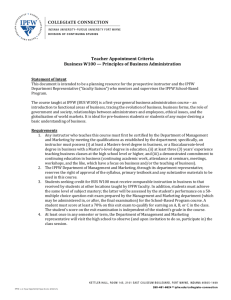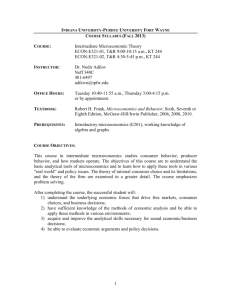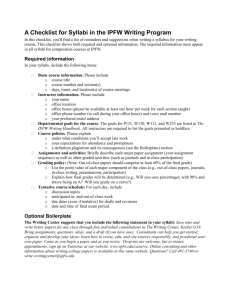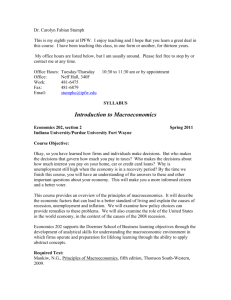model classroom syllabus
advertisement
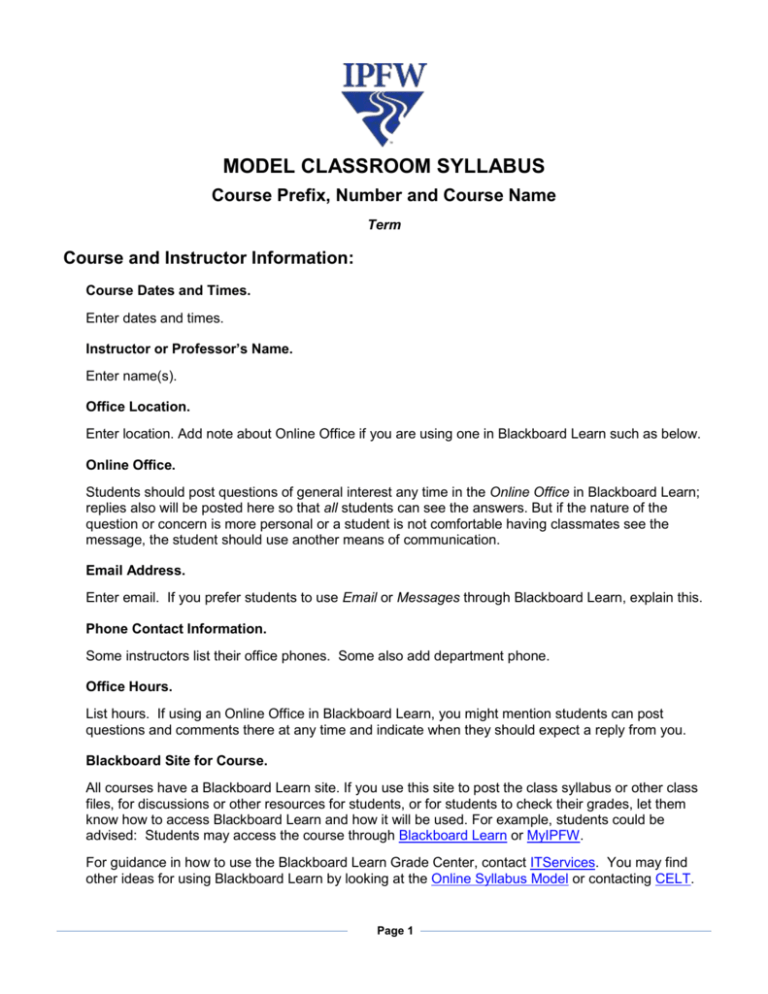
MODEL CLASSROOM SYLLABUS Course Prefix, Number and Course Name Term Course and Instructor Information: Course Dates and Times. Enter dates and times. Instructor or Professor’s Name. Enter name(s). Office Location. Enter location. Add note about Online Office if you are using one in Blackboard Learn such as below. Online Office. Students should post questions of general interest any time in the Online Office in Blackboard Learn; replies also will be posted here so that all students can see the answers. But if the nature of the question or concern is more personal or a student is not comfortable having classmates see the message, the student should use another means of communication. Email Address. Enter email. If you prefer students to use Email or Messages through Blackboard Learn, explain this. Phone Contact Information. Some instructors list their office phones. Some also add department phone. Office Hours. List hours. If using an Online Office in Blackboard Learn, you might mention students can post questions and comments there at any time and indicate when they should expect a reply from you. Blackboard Site for Course. All courses have a Blackboard Learn site. If you use this site to post the class syllabus or other class files, for discussions or other resources for students, or for students to check their grades, let them know how to access Blackboard Learn and how it will be used. For example, students could be advised: Students may access the course through Blackboard Learn or MyIPFW. For guidance in how to use the Blackboard Learn Grade Center, contact ITServices. You may find other ideas for using Blackboard Learn by looking at the Online Syllabus Model or contacting CELT. Page 1 Purpose: Catalogue Description. What the IPFW Undergraduate Bulletin, Program Descriptions says about your course. Instructor Description. Give an overview of the course's purpose. Provide an introduction to the subject matter and show how the course fits in the college or department curriculum, or the Baccalaureate Framework. You may also want to reference the questions and answers about General Education requirements. Explain what the course is about and why students would want to learn the material. Identify the instructional approach to the content of the course. Course Goals and Objectives. The goal is the larger purpose of the course as suggested in the following examples. “This course will prepare you to understand the physical laws that govern the movements of stars and the energy production in the stars.” “This course is an introduction to the discipline of comparative politics.” “In this course students will learn the facts and concepts of personal financial management practices.” “Students will understand how theories of psychology apply to strategies for resolving contemporary social problems.” Learning objectives state the knowledge, skills, abilities, and attitudes that students should gain from successfully completing the course. List three to five objectives that you expect all students to strive for. Learning objectives should be stated in behavioral terms as shown in the examples below. At the end of this course, the successful student will be able to accomplish the following objectives. Objective 1. Compare and contrast the theories that influence twentieth century psychology. Objective 2. Explain the limits of using each of these theories for different types of problems. Objective 3. Identify differences in probable outcomes when each theory is applied to sample case studies. It is a best practice to show how the learning objectives relate to one or more program goals objectives. If the course fulfills a general education requirement, also include that information here. An excellent reference for writing learning objectives is Chapter 12 of Blueprint for Learning by Laurie Richlin, which is distributed in new faculty orientation and is available in the CELT Library. Some online resources include: A Model for Learning Objectives (Iowa State University). Reading and Composition (University of California, Berkeley). How to Write Learning Objectives (Instructables). Learning Goals and Student Learning Outcomes (College of Business, California State University, Chico). Page 2 Requirements: Required Texts. Book title in appropriate citation style (for example, APA, ALA, MLA, or other used in your discipline). Add ISBN(s). Mention any supplemental resources, such as online resources from publisher and how to access them. If using electronic textbooks (eBooks), give similar information and how to access them. List any readings placed on reserve in the library and, if used, give link to Helmke Reserves Express. Mention any required resources located in the Blackboard Learn course site. If you are using Reserves Express and making some readings available through the Blackboard site for your course, you might include the link to Helmke Library’s Reserves Express. Highly Recommended Texts. Book title in appropriate citation style (for example, APA, ALA, MLA, or other), and as appropriate, the library reserve call number, eLearning Blackboard link to the course, or the link to Reserves Express. Additional, Materials, Equipment or Skills. For example, lab or safety equipment, art supplies, calculators, computers, drafting materials, MS Word, Excel, or other items or particular skills needed for the course. Assignments. List and state the nature and format of the assignments, the expected length of essays, and their deadlines. Give examination dates and briefly describe the nature of the tests (multiple choice, essay, short-answer, take-home tests). How do the assignments relate to the learning objectives for the course? What are your expectations for written work? In setting up the syllabus, try to keep the workload balanced throughout the term. Grades: Describe the grading procedures, including the components of the final grade and the weights assigned to each component (for example, homework, term papers, midterms, and final exams). Clearly describe your expectations for all assignments. Include rubrics as scoring guides for major assignments as an addendum to the syllabus. State if you grade on a curve or use an absolute scale, or if any quiz grades will be dropped (check department policy before implementing these strategies). If participation is included as a portion of students’ grade, state specifically how that will be assessed and how students will be informed of their participation grade. Similarly, if attendance is required, state how it will be tracked. State how and when students’ graded work will be returned to them, such as at the next class, or by next week. Course Policies: State policies regarding class attendance, turning in late work, missing homework, tests or exams, make-ups, requesting extensions, reporting illnesses, cheating and plagiarism, changes to the syllabus, Page 3 such as those shown in the following examples. Attendance and Timely Submissions. Enumerate policies about attendance, late work, missed deadlines and tests, make-up opportunities, delayed grades, and other related issues. Here are a few examples: “Late papers will not be accepted. Delayed grades will not be assigned. Please speak with me to resolve problems you encounter.” “Lab reports are due on Friday, date, at 5:00 p.m. in the department office. Five points will be deducted for each day that the report is overdue. ” “Class attendance and participation is essential for success. It is your responsibility to clarify missed assignments with classmates or with me prior to the next class.” “Requests for exceptions to these policies must be discussed with me in advance”. Expectations for Submitting Required Work. Enumerate expectations for submitting required work. Here are a few examples: “Submitted work will be typed, double-spaced and submitted on disk, electronically, using 12 point Arial font, and saved as a DOCX file or RTF file.” “Written work must adhere to the style of APA.” “Written work will be evaluated for composition and grammar.” “When students’ work conveys that they require additional help in writing or studying, students will be referred to the Writing Lab. If they require additional help with math, they will be referred to the Math Lab.” Academic Honesty. Explain your expectations for academic honesty and particularly what this means in your course. Here are a couple of examples. “Plagiarism is the use of another person’s words or ideas without crediting that person. Plagiarism and cheating will not be tolerated and may lead to failure on an assignment, in the class, and dismissal from the University.” (Refer to School/College guidelines.) “You are responsible for being attentive to or observant of campus policies about academic honesty as stated in the University’s Student Conduct Code.” Depending on the course level, students may need more guidance on the process of searching and writing, as illustrated in the following example. “Students who need extra support in how to do research-based writing should use one or both of the following additional resources: Bedford St. Martin’s Research and Documentation and Purdue Online Writing Lab.” If using an honor code specific to this course, it could be added in this section. If using an honor code statement as the first part of an exam, that could be mentioned, too. Page 4 Special Needs. Although you may wish to address other special needs, one that is important to include is the statement regarding students who require accommodation due to disabilities. “IPFW is committed to providing reasonable accommodation and access to programs and services to persons with disabilities. If you have a disability or acquire one, contact the office of Services for Students with Disabilities, (SSD) Walb Student Union Room 113, 260-481-6658. This disabilities statement should be included: “If you have a disability and need assistance, special arrangements can be made to accommodate most needs. Contact the Director of Services for Students with Disabilities (Walb Union, Room 113, telephone number 481-6658) as soon as possible to work out the details. Once the Director has provided you with a letter attesting to your needs for modification, bring the letter to me. For more information, please visit the web site for Services for Students with Disabilities.” Civility and Ground Rules for Discussion. Explain your expectations for discussions in the classroom. “Turn off beepers and cell phones during class.” “Adherence to the Student Conduct Code is expected.” “I am committed to creating a climate for learning characterized by respect for one another and the contributions each person makes to class. I ask that you make a similar commitment.” “Disagreement and debate is a norm in college classrooms, but civility is necessary.” “Each person in this course has unique prior experiences and a unique viewpoint to share. This offers a great opportunity for us to learn from each other. Though disagreement and even conflict may occur, I expect your cooperation in maintaining an atmosphere of mutual respect. When participating in discussions, it is perfectly acceptable to have strong opinions – in fact I encourage you to do so. I also encourage you to discuss your own personal experience and relate it to that of others. In the process, however, I expect you to respect the basic intelligence and humanity of each participant in the discussion. Conflict is not necessarily a bad thing, as long as there is a commitment to mutual respect. Hateful and demeaning speech will not be tolerated.” If you use Blackboard Learn for some discussions, explain your expectations these, too. For lower level courses, consider a link to a “netiquette” resource such as Albion’s Core Rules of Netiquette. Provide a list of what you expect students to accomplish in their communication with each other regarding content and style of communication. Examples are available on the web and through consultation with CELT. For Email or Messages netiquette, consider stating the need for putting the topic of the message in the Subject and for adding the student’s name to the close of the message. The IPFW Student handbook provides particular guidelines for classroom discussions, use of computer resources, and classroom management when problems arise. In the section of THE IPFW CODE OF STUDENT RIGHTS, RESPONSIBILITIES, AND CONDUCT, PART I STUDENT RIGHTS AND RESPONSIBILITIES, Section B, Individual Rights and Responsibilities as Students, several rights and responsibilities are explained, among them the role of discussions, whether in a physical classroom or in the electronic classroom of an online Page 5 course: “In the classroom, students have the freedom to raise relevant issues pertaining to classroom discussion, to offer reasonable doubts about data presented, and to express alternate opinions to those being discussed. However, in exercising this freedom, students shall not interfere with the academic process of the class.” There is also the following statement about Ethical Guidelines for Computer Users: “University computer resources are designed to be used in connection with legitimate, university-related purposes. The use of university computing resources to disseminate obscene, pornographic, or libelous materials; to threaten or harass others; or otherwise to engage in activities forbidden by the Code is subject to disciplinary action as specified in the Code.” Students can read more about rights and responsibilities in the handbook and the spirit in which our university seeks to “maintain the campus as a place of work and study for faculty, staff, and students.” In support of these rights and responsibilities, students interfering with the academic process of the class or otherwise behaving contrary to the Code will be: First, warned by the instructor to cease the behavior. Thereafter, referred to the Dean of Students for disciplinary action if instructor warning is not heeded. Diversity and Nondiscrimination. Statement from the IPFW Student Handbook: “IPFW is committed to maintaining a community that recognizes and values the inherent worth and dignity of every person; fosters tolerance, sensitivity, understanding, and mutual respect among its members; and encourages each individual to strive to reach his or her own potential. In pursuit of its goal of academic excellence, the university seeks to develop and nurture diversity. The university believes that diversity among its many members strengthens the institution, stimulates creativity, promotes the exchange of ideas, and enriches campus life. IPFW prohibits discrimination against any member of the university community on the basis of race, religion, color, sex, age, national origin or ancestry, marital status, parental status, sexual orientation, disability, or status as a disabled or Vietnam-era veteran.” Blackboard Learn Support If you use Blackboard Learn for online course support, explain to students how to access the course site and give them support resources such as the following. Blackboard and Computer Training Welcome to Blackboard Help for Students!; Lynda.com (Web Training Link); STEPS Computer Workshops (STEPS = Student Technology Education ProgramS). Help and Troubleshooting Information Technology Services; Email IT Services Help Desk; ITServices Help Desk. IPFW Services for Students: Page 6 You may wish to refer students to the following services. Services for Students with Disabilities, (SSD) Walb Student Union, Room 113, 260-481-6658, support in accommodating needs related to disabilities. Center for Academic Support & Advancement (CASA), Kettler G23, 481-6817, study skills development, tutoring, STEPS short courses, supplemental instruction, English as a Second Language (ESL). The Writing Center, Learning Commons on the 2nd floor of Helmke Library, 481-5740, peer tutors who can help with all phases of the writing process. Career Services, Kettler 109, 481-0689, assistance with on and off-campus job placement and internships. Information Technology Services Help Desk, Kettler 206, 481-6030, information on all aspects of computing at IPFW; hardware and software support (including Blackboard Vista 4); student e-mail accounts. Studio M, Walb 220, 481-0114, Curriculum-based multimedia lab for students that offers assistance customized to student needs and course requirements. Center for Women and Returning Adults, Walb 120, 481-6029, workshops, support groups, counseling, and other programs. Multicultural Services, Walb 118, 481-6921, skills workshops, support groups, diversity training, counseling, mentoring, cultural heritage programs; ASAP program. International Student Services, Kettler 104, 481-6034 or 481-6923, visa and INS issues; help with housing, counseling. Mastodon Advising Center (MAC), Kettler 109, 481-6595, appointments with professional academic advisors; help with guiding students in deciding on their major and ultimately their career; help for exploring students, deciding students, and readmitted students; and various student resources. Helmke Library Service Desk, 481-6505, reference librarian help, books, journals, reference, interlibrary loan reserve readings for courses. Other important library services for students: Helmke Library Services Orientation, to get an overview of library services. Ask a Librarian, to ask a librarian in person, by email, instant messenger chat, or phone. Find Your Librarian, to find a librarian specialist for the subject you are studying and get the help you need. Reserves Express (REX), to find readings from the library’s online holdings that your instructor may have reserved for your course. Dean of Students Office, Walb 111, 481-6601, student health insurance, mentoring, grade appeals; free short-term personal counseling and support. Course Schedule: The schedule should include the sequence of course topics, the preparations or readings, and the assignments due. For the readings, give page numbers in addition to chapter numbers this will help students budget their time. Exam dates should be firmly fixed, while dates for topics and activities may be listed as tentative. Notify students in writing if the syllabus is revised. Date: [Insert date.] Topic: [Insert topic.] Required Reading and Preparation: [list] Activities and Assignments: [list] Page 7 Date: [Insert date.] Topic: [Insert topic.] Required Reading and Preparation: [list] Activities and Assignments: [list] [Repeat for each week.] NOTE: If you do not post the syllabus online, using it only as a class handout, you can use a regular table format. However, if you do post the syllabus online, a regular Word formatted table format will NOT meet requirements listed in the Accessibility Checklist for IPFW Web Authors which is a brief list of the IPFW accessibility standards for an online document. To be web accessible, a table must have both clear explicit heading labels and quick style names to designate the first row first column, second row second column, and so on. The use of tabs, paragraph indentations, and the space bar to make a table format does not work for web accessibility because screen readers read the underlying code, not just the information that appears on the page. This underlying code, which is put in place by the computer operations, will interfere with computer screen readability for persons with certain disabilities. IT Services can assist with creating an accessible format for a table. Important Dates: Refer students to the academic calendar for important dates such as the last day to withdraw without receiving a grade. You may also want to list important dates from the course schedule. Tips for Success: If you have experience teaching this class, share with students strategies used by successful students in the past. If you don’t know for sure, ask colleagues who have taught your course or courses at that level. Explain how such strategies apply to course study and assignments. Examples: “Doing the reading assigned for each class before coming to class is necessary to benefit from what we do in class. The Tentative Course Schedule indicates the dates by which reading assignments must be completed before class.” “You are not being asked to accept ideas uncritically. On the contrary, it is essential that you challenge ideas with which you disagree or about which you are skeptical. You also should be able to support ideas with which you agree using appropriate evidence (i.e., not just "I agree"; why do you agree?). Thus, critical thinking about the reading (as well as movies you will see as part of the course, what goes on in class, and assignments) is important. Ask yourself such questions as: Do I "buy" the idea? Does the concept or procedure make sense? Why? What is the evidence for or against an idea? What limitations does the idea have? What are my views on an issue and what leads me to think that way? These are just a few of the questions that stimulate critical thinking.” Page 8 Student Expectations of the Instructor: You’ve told students what you expect of them; it’s only fair to let them know what they can expect of you. Possible topics include: availability (when you are available), organization, major responsibility for the learning environment, extent of flexibility, special areas of expertise. Course Communication: If not already addressed earlier in the syllabus, you may want to add the following kinds of statements. “In addition to announcements made and written handouts distributed in class, I may need to contact you between classes, which I'll do through individual and group email messages. One of the requirements for this course is that you (e.g. maintain an IPFW email address and check it regularly for messages; check Blackboard, etc.). You are responsible for any messages, including assignments and schedule changes, I send you via email.” “The best method and time to contact me is (Blackboard, Email, office phone). In addition to my office phone, you can call the department at …….. I will generally get back to you within “X” days. Students Called for Military Duty: “If you are a student in the military with the potential of being called to military service and /or training during the course of the semester, you are encouraged to contact your advisor immediately.” Additonal Note: This syllabus, with its course schedule, is based on the most recent information about the course content and schedule planned for this course. Its content is subject to revision as needed to adapt to new knowledge or unanticipated events. Updates will remain focused on achieving the course objectives and students will receive notification of such changes. Students will be notified of changes and are responsible for attending to such changes or modifications posted on the Blackboard Learn site for this course. URLs for Web Sites: Rather than posting URLs in the narrative of the syllabus, the URLs can be listed at the end of the syllabus document. This can be helpful to students who print out their syllabus. For example: The URLs for the web sites referenced in this document are listed below in alphabetical order. Academic Calendar: http://ipfw.edu/academics/calendar/. Ask a Librarian: http://library.ipfw.edu/find/ask-a-librarian.html. Baccalaureate Framework: http://ipfw.edu/academics/programs/baccalaureate-framework.html. Bedford St. Martin’s Research and Documentation: http://bcs.bedfordstmartins.com/resdoc5e/. Career Services: http://www.ipfw.edu/career/. Center for Academic Support & Advancement (CASA): http://www.ipfw.edu/casa. Center for Women and Returning Adults: http://ipfw.edu/cwra/ . Dean of Students Office: http://ipfw.edu/dos/ . Find Your Librarian: http://library.ipfw.edu/?progSelectDropDown=Find+Your+Librarian. Goals and Objectives of the IPFW Baccalaureate Degree, Learning Outcomes and Requirements: Page 9 http://ipfw.edu/offices/oaa/programs/GenEdProgram.html. Helmke Library Service Desk. http://library.ipfw.edu/about/service-desk/index.html. Helmke Library Services Orientation. http://guides.library.ipfw.edu/services. Information Technology Services Help Desk: http://ipfw.edu/helpdesk/ . International Student Services: http://ipfw.edu/iss/. IPFW Code of Student Rights, Responsibilities, and Conduct: http://bulletin.ipfw.edu/content.php?catoid=25&navoid=639#Code. Library Service Desk: http://guides.library.ipfw.edu/services. Mastodon Advising Center (MAC): http://ipfw.edu/mac/ . Multicultural Services: http://ipfw.edu/odma/. Purdue Online Writing Lab (OWL): http://owl.english.purdue.edu/owl/section/2/10/. Reserves Express (REX): http://library.ipfw.edu/find/reservesexpress/index.html. Services for Students with Disabilities: http://www.ipfw.edu/ssd/. Studio M: http://ipfw.edu/studiom/. The Writing Center: http://ipfw.edu/offices/casa/writing/. Undergraduate Bulletin, Part 5: Program Descriptions: http://bulletin.ipfw.edu/content.php?catoid=25&navoid=636. University Calendar: http://ipfw.edu/academics/calendar/. Page 10
